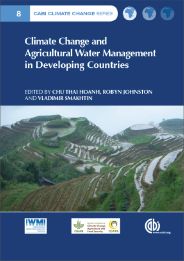Citation:
Hoanh, Chu Thai; Johnston, Robyn; Smakhtin, Vladimir. 2015. Climate change and agricultural water management in developing countries. Wallingford, UK: CABI. 227p. (CABI Climate Change Series 8)

Chapter 1:
Hoanh, Chu Thai; Johnston, Robyn; Smakhtin, Vladimir. 2015. Climate change and agricultural development: a challenge for water management. In Hoanh, Chu Thai; Johnston, Robyn; Smakhtin, Vladimir. Climate change and agricultural water management in developing countries. Wallingford, UK: CABI. pp.1-10. (CABI Climate Change Series 8)
Chapter 2:
Maskey, S.; Bhatt, D.; Uhlenbrook, S.; Prasad, K. C.; Babel, M. S. 2015. Adaptation to climate change impacts on agriculture and agricultural water management – a review. In Hoanh, Chu Thai; Johnston, Robyn; Smakhtin, Vladimir. Climate change and agricultural water management in developing countries. Wallingford, UK: CABI. pp.11-31. (CABI Climate Change Series 8)
Chapter 3:
Sood, Aditya. 2015. Global water requirements of future agriculture: using WATERSIM. In Hoanh, Chu Thai; Johnston, Robyn; Smakhtin, Vladimir. Climate change and agricultural water management in developing countries. Wallingford, UK: CABI. pp.32-47. (CABI Climate Change Series 8)
Chapter 4:
Liu, Q.; Yan, C.; Yang, J.; Mei, X.; Hao, W.; Ju, H. 2015. Impacts of climate change on crop water requirements in Huang-Huai-Hai Plain, China. In Hoanh, Chu Thai; Johnston, Robyn; Smakhtin, Vladimir. Climate change and agricultural water management in developing countries. Wallingford, UK: CABI. pp.48-62. (CABI Climate Change Series 8)
Chapter 5:
Xia, J.; Mo, X.; Wang, J.; Luo, X. 2015. Impacts of climate change and adaptation in agricultural water management in North China. In Hoanh, Chu Thai; Johnston, Robyn; Smakhtin, Vladimir. Climate change and agricultural water management in developing countries. Wallingford, UK: CABI. pp.63-77. (CABI Climate Change Series 8)
Chapter 6:
Lansigan, F. P.; Cruz, A. C. D. 2015. Climate change impacts and adaptation in agricultural water management in the Philippines. In Hoanh, Chu Thai; Johnston, Robyn; Smakhtin, Vladimir. Climate change and agricultural water management in developing countries. Wallingford, UK: CABI. pp.78-96. (CABI Climate Change Series 8)
Chapter 7:
Kakumanu, Krishna Reddy; Kuppannan, Palanisami; Aggarwal, Pramod Kumar; Ranganathan, C. R.; Nagothu, U. S. 2015. Adaptation strategies to address the climate change impacts in three major river basins in India. In Hoanh, Chu Thai; Johnston, Robyn; Smakhtin, Vladimir. Climate change and agricultural water management in developing countries. Wallingford, UK: CABI. pp.97-119. (CABI Climate Change Series 8)
Chapter 8:
Phong, N. D.; Hoanh, Chu Thai; Tho, T. Q.; van Ngoc, N.; Dong, T. D.; Tuong, T. P.; Khoi, N. H.; Hien, N. X.; Nam, N. T. 2015. Water management for agricultural production in a coastal province of the Mekong River Delta under sea-level rise. In Hoanh, Chu Thai; Johnston, Robyn; Smakhtin, Vladimir. Climate change and agricultural water management in developing countries. Wallingford, UK: CABI. pp.120-134. (CABI Climate Change Series 8)
Chapter 9:
Kam, S. P.; Nhuong, T.; Hoanh, Chu Thai; Hien, N. X. 2015. Aquaculture adaptation to climate change in Vietnam’s Mekong Delta. In Hoanh, Chu Thai; Johnston, Robyn; Smakhtin, Vladimir. Climate change and agricultural water management in developing countries. Wallingford, UK: CABI. pp.135-153. (CABI Climate Change Series 8)
Chapter 10:
Villholth, Karen. 2015. Groundwater for food production and livelihoods – the nexus with climate change and transboundary water management. In Hoanh, Chu Thai; Johnston, Robyn; Smakhtin, Vladimir. Climate change and agricultural water management in developing countries. Wallingford, UK: CABI. pp.154-175. (CABI Climate Change Series 8)
Chapter 11:
Savoskul, Oxana; Shevnina, E. 2015. Irrigated crop production in the Syr Darya Basin: climate change rehearsal in the 1990s. In Hoanh, Chu Thai; Johnston, Robyn; Smakhtin, Vladimir. Climate change and agricultural water management in developing countries. Wallingford, UK: CABI. pp.176-192. (CABI Climate Change Series 8)
Chapter 12:
Sander, B. O.; Wassmann, R.; Siopongco, J. D. L. C. 2015. Mitigating greenhouse gas emissions from rice production through water-saving techniques: potential, adoption and empirical evidence. In Hoanh, Chu Thai; Johnston, Robyn; Smakhtin, Vladimir. Climate change and agricultural water management in developing countries. Wallingford, UK: CABI. pp.193-207. (CABI Climate Change Series 8)
Chapter 13:
Prosinger, J.; Suhardiman, Diana; Giordano, M. 2015. Linking climate change discourse with climate change policy in the Mekong: the case of Lao PDR. In Hoanh, Chu Thai; Johnston, Robyn; Smakhtin, Vladimir. Climate change and agricultural water management in developing countries. Wallingford, UK: CABI. pp.208-220. (CABI Climate Change Series 8)

